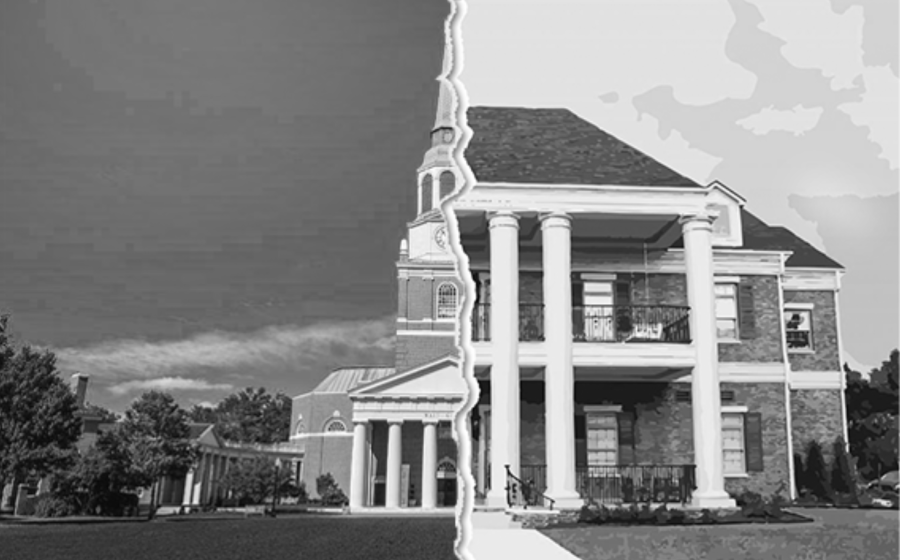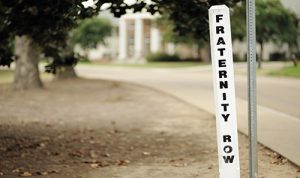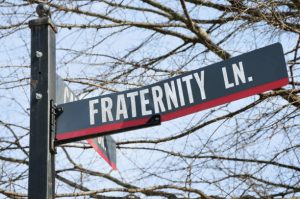Our real government: Greek life
It’s time for students to hold fraternities and sororities accountable
Multiple writers for the Opinion section wrote critiques of Greek life.
April 13, 2023
When the 2022-2023 Student Government budget started to circulate on Fizz, I was glad to see that students were finally asking meaningful questions about the election of the student body president. People have long needed to understand that the position is not just a popularity contest but a decision about who represents you and who wields a substantial amount of power on campus, some of it being in the form of the organization’s allotted money.
For the second consecutive year, there has been a lot of debate and gossip around the two presidential candidates that became remarkably unproductive. Every year, students complain about the ineffectiveness of Student Government and how they see it as a meaningless institution that cannot change things, and then the discussion devolves into malicious comments about the personal lives and character of the candidates.
Wake Forest students more often than not believe that Student Government doesn’t really matter. In a way, they’re right.
Student Government and other organizations, like the Old Gold & Black, for instance, receive large amounts of money from the university and use it to serve the Wake Forest community and provide professional development for their members. To many people, that matters and can change many things. But to social organizations such as fraternities and sororities, these clubs can often be seen as jokes.
I’m not attacking the importance of Student Government or other organizations here. I was Editor-in-Chief of the Old Gold & Black for a year and was fully invested in the idea that the reporting and creativity of my staff could make a difference on campus. In fact, I still believe that. It’s why I chose to write this article.
What I am saying is that the actions and membership of organizations like Student Government and the campus newspaper don’t have much influence on the real student-run power broker at Wake Forest University: Greek life.
Fraternities and sororities are the dominant forms of social life on campus. Over the past four years, membership for Greek life among undergraduates has increased 4%, to 2745 students out of the total population of approximately 5300. If you want more proof of this dominance, go on any campus tour and listen as the guide stops outside of a lounge and delivers a five-minute disclaimer about the Greek life experience at Wake Forest. They’ll admit that it’s kind of the thing everybody does here. Go stand outside any dorm on campus on a Wednesday, Friday or Saturday night and watch charter buses load hundreds of students for date functions, or wait a little later and see them cramming into pledge drivers’ cars.
As a concept, being a member of Greek life should be fun. They should be social clubs that fit your character, passions and interests — one that allows you to find lifelong friends and make unforgettable memories. Greek organizations should be powerful, charitable forces for good. Many of my friends have found this in fraternities and sororities, and I’m happy for them. It’s what people are looking for in their college experience.
But not everyone finds it.
There are many people who are excluded from these organizations. If this is happening, then people need to start acknowledging fraternities and sororities for what they really are — the government of our student body. They regulate and represent most students, and they have to be held accountable for their actions. If this doesn’t happen, Wake Forest, like other higher education institutions across America, will continue to have campus life that is exclusive, discriminatory and destructive.
If you don’t believe that we have an experience like this, take a look at what’s happened in the last four years. Two of the largest student-led protests in school history led the administration to realize that the campus climate surrounding sexual assault and harassment is dire. Half of the Sexual Assault Prevention Support and Accountability (SAPSA) survey sample — 38% of the school’s population — reported experiencing at least one incident of sexual misconduct.
We cannot afford to pretend that everyone is responsible for this problem. Students and the university have to look at the most popular form of social organization — Greek life.
The campus climate survey didn’t make a distinction to the role these organizations have played in these issues, nor did it even appear to collect data regarding the social membership of respondents. You cannot reasonably expect to change any problems of sexual misconduct without analyzing the role of social organizations in which half of the undergraduate population holds membership.
These social organizations create breeding grounds for sexual misconduct. Just last year, Lauren Carpenter, a member of the staff of the Old Gold & Black, bravely shared her experience with this issue.
People who have tried to solve this problem or discuss it have included national context to show you that this is a problem everywhere, which is extremely unproductive. The only way that this is going to get fixed is for everyone to realize that these are our sororities and fraternities, and these are our problems.
It isn’t at all difficult for me to point out the disgusting issues with many of Wake Forest’s Greek life organizations. Their secret recruitment processes rank prospective students based on their physical characteristics, wealth and social status, leading to exclusion that is damaging to people. As staff columnist Abby Bermeo wrote in 2021, “Greek life is rooted in white elitism, and wealth continues to play a significant role in the social dynamics of Greek society today.”
Any other solution that doesn’t address these organizations will fail. The only way that this community will overcome issues of sexual misconduct and exclusionary social life is by working together.
Students have to take control of their fraternities and sororities and make sure that these practices aren’t being recreated. Sororities and fraternities need to have recruiting processes that are more visible, and thereby more equitable. Partying should be made safer — schools like Brown have encouraged drinking and partying in dormitories rather than more unsafe off-campus destinations.
Administrators and Student Government must at least look at the problem in a more comprehensive way. If the national context of fraternity culture is tied to sexual misconduct and assault, so much so that many members of fraternities and sororities across the United States are calling for the abolition of Greek life, shouldn’t it stand to reason that we should at least look critically at our fraternities and sororities?
Wake Forest must be bold and take action when unrecognized fraternities like Delta Kappa Epsilon (DKE) create harmful environments for students. If this chapter is composed entirely of Wake Forest students, and they use the university’s name to recruit, then the administration has a responsibility to intervene through the law when students experience sexual misconduct from these fraternities.
I’ve spent four years here at Wake Forest and have loved every minute of it. I will forever be indebted to our administration for their hard work, which made my experience better than I could have ever dreamed.
But at the same time, I’ve been really hard on them. This is because I am honest about what happens at this school and how things can be improved. I still think that can make a difference, and that’s why I continue to do it. This is my final appeal to the Wake Forest community: Please work to make this right. As a student who has constantly seen and trusted in the radical potential of the Wake Forest community, I know that your efforts will be worth their weight.
Correction April 14: A previous version of this article mischaracterized staff columnist Abby Bermeo’s argument in her 2021 opinion piece, “Greek life requires reform, not abolition.” The language in the article has been corrected to quote, rather than interpret, Bermeo’s original words.



















